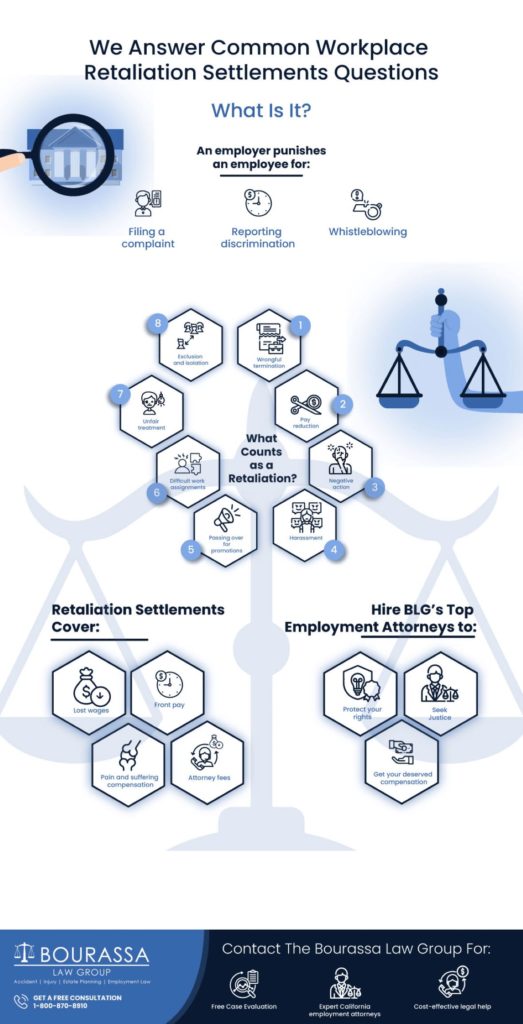
Workplace retaliation is a troubling reality that many employees face at some point in their careers. It occurs when an employer takes adverse action against an employee in response to their engagement in legally protected activities. If you’ve experienced retaliation at work or are concerned about your rights as an employee, you probably have many questions. In this comprehensive guide, we’ll answer the most commonly asked questions about workplace retaliation settlements, empowering you with the knowledge you need to navigate this challenging situation.

I. What is Workplace Retaliation?
Workplace retaliation occurs when an employer punishes an employee for engaging in legally protected activities. These activities may include filing a formal complaint, reporting discrimination, blowing the whistle on unlawful behavior, or participating in other protected activities as defined by employment law.
II. What Is an Adverse Action?
An adverse action is any action taken by an employer that harms the employee’s job conditions, terms of employment, or status in the workplace. This can include anything from demotions and pay reductions to harassment and wrongful termination.
III. How Does Retaliation Manifest?
Retaliation is a complex and multifaceted issue that can manifest in various ways in the workplace. Understanding how retaliation can manifest is essential for employees to recognize when their rights might be violated and for employers to avoid engaging in unlawful behavior. Here are some of the different forms that retaliation can take place:
Wrongful Termination: Wrongful termination is one of the most blatant forms of retaliation. It occurs when an employer fires an employee in response to their engagement in a legally protected activity, such as reporting workplace misconduct, discrimination, or harassment. It’s a direct and severe adverse employment action that can have a significant impact on the employee’s livelihood.
Pay Reduction: Retaliation may involve reducing an employee’s pay or altering their compensation structure as a means of punishing them for their protected activities. This can manifest as cutting an employee’s salary, denying them a promised raise, or reducing their commission or bonus potential.
Negative Action: Negative actions can encompass a wide range of behaviors intended to harm an employee’s job conditions or prospects. These actions may include assigning the employee undesirable work tasks, reducing their responsibilities, or isolating them within the organization. Adverse employment actions are designed to create a hostile work environment and deter the employee from continuing their protected activities.
Harassment: In some cases, retaliation can take the form of ongoing harassment. This can include verbal abuse, sexual harassment, intimidation, exclusion, or any behavior that creates a hostile and emotionally distressing atmosphere for the employee. Harassment as retaliation aims to silence the employee by making the workplace unbearable.
Passing Over for Promotions: Retaliation may involve denying an employee well-deserved promotions or advancements in their career. Even when an employee is qualified and deserving of such opportunities, an employer may deliberately overlook them as a form of punishment for their protected activities.
Difficult Work Assignments: Retaliatory employers might assign employees additional work, particularly challenging projects, or tasks that are outside of their job description. These assignments are meant to overwhelm the employee and hinder their ability to engage in protected activities.
Unfair Treatment: Employees who experience retaliation might find themselves subjected to unfair and inconsistent treatment. This can include arbitrary disciplinary actions, unfair performance evaluations, or sudden changes in their job responsibilities, which may be disproportionate to their actual performance or the actions taken by other employees.
Exclusion and Isolation: Retaliation can also manifest through social exclusion and isolation. An employee who engages in protected activities may find themselves marginalized within the workplace, with colleagues and supervisors avoiding them or refusing to collaborate. Such isolation can have severe emotional and professional consequences.
Existing employees and job applicants may both face such issues.
IV. How Hard Is It to Win a Retaliation Lawsuit?
To succeed in a retaliation claim, you must establish a causal connection between your protected activity and the adverse employment action taken against you. This requires strong evidence that demonstrates the link between the two. An experienced retaliation attorney can help you build a compelling case.
V. What Are Common Retaliation Claims?
Retaliation claims are commonly associated with various workplace issues, including discrimination, harassment, and retaliation against workers who file workers’ compensation claims or act as whistleblowers. If you believe you’ve been retaliated against after engaging in protected activity, you may be entitled to compensation.
VI. What Legal Rights Protect Employees?
Employees in the United States are safeguarded by several federal laws that prohibit workplace retaliation. These include the Federal Civil Rights Act of 1964 and the Sarbanes-Oxley Act. Violations of these laws can lead to employer liability.
VII. How Do Retaliation Lawsuits Work?
If you’ve been subjected to retaliation and decide to pursue legal action, you should consult an employment lawyer. They will evaluate your case and help you file a lawsuit against your employer. This process aims to obtain fair compensation for the harm you’ve suffered due to the retaliation.
VIII. How Can You Obtain Compensation?
To obtain compensation for retaliation, you may either go through a settlement or take your case to trial. The choice between these options depends on the strength of your case, the evidence you have, and your personal preferences, as well as the advice of a seasoned employment attorney. An experienced employment lawyer can help you determine the best course of action.
IX. What Are Retaliation Settlements?
Retaliation lawsuit settlements are agreements reached between the employee and employer before a case goes to trial. These settlements typically involve the payment of a certain sum of money to the employee in exchange for them dropping the lawsuit. Settlements can provide a faster and more predictable resolution compared to a jury verdict.
X. What to Ask for in a Retaliation Settlement?
When pursuing a retaliation settlement, it’s essential to understand what you can ask for and what you may be entitled to as part of the settlement negotiations. The specific terms of a retaliation settlement can vary depending on the circumstances of your case and the negotiations with your employer. Here are some common elements and considerations to include in a retaliation settlement:
Economic Damages Compensation:
Back Pay: This covers the lost wages and benefits you would have earned had you not faced retaliation. It’s a significant component of most retaliation settlements.
Front Pay: If you can demonstrate that you won’t be able to return to your job or that your career prospects have been severely damaged, front pay may be awarded. It covers future earnings and benefits.
Compensatory Damages: This includes compensation for emotional distress, pain and suffering, and any other non-economic losses you’ve experienced as a result of the retaliation.
Punitive Damages: In particularly egregious cases, you may be entitled to punitive damages, which are intended to punish the employer for their behavior and deter future misconduct.
Attorneys Fees and Costs:
It’s common for retaliation settlements to include a provision where the employer agrees to pay attorney fees and any legal costs incurred during the lawsuit.
Non-Monetary Terms:
Reinstatement: You may want to include terms for your reinstatement to your previous position or a comparable one if you were wrongfully terminated or demoted.
No Admissions of Liability: Often, employers may agree to a settlement without admitting wrongdoing. This can be a practical way to avoid legal disputes.
Confidentiality: You may wish to include a confidentiality clause that prevents both you and your employer from disclosing the terms and details of the settlement.
Non-Disparagement: A non-disparagement clause can prevent either party from making negative statements about the other in the future.
References: You might ask for a neutral reference from your former employer to help mitigate any potential harm to your future job prospects.
Future Protections: Some settlements may include provisions that protect you from future retaliation, such as requiring the employer to implement anti-retaliation policies or providing you with job security guarantees.
XI. What Are the Steps to File a Lawsuit?
If you decide to file a retaliation lawsuit, here are the basic steps involved:
Consult an employment lawyer: The first step is to find an attorney experienced in workplace retaliation cases. They will evaluate your case’s merits and advise you on the best course of action.
File a complaint: Your attorney will help you draft a formal complaint outlining the details of your retaliation claim. This is the document that initiates the lawsuit.
Legal process: The lawsuit will go through various legal processes, including discovery, where both parties gather evidence and potential settlement negotiations.
Trial: If no settlement is reached, your case will proceed to trial. A jury will evaluate the evidence and make a verdict.
XII. Are There Any Particular Cases with a High Retaliation Claim Worth?
Yes, in particularly egregious cases, retaliation claims can be worth a significant amount. If the retaliation resulted in severe harm to the employee, such as extensive emotional distress, financial losses, or damage to their professional reputation, the potential compensation can be substantial.
XIII. Can You Contact Your HR Manager to Resolve a Retaliation Case?
A human resources manager often plays a significant role in retaliation cases. They may be involved in the retaliation complaint process, the investigation, and potential attempts to resolve the issue internally. It’s essential to be aware that HR managers have a duty to address retaliation claims in accordance with the law.
XIV. What Is the Role of the EEOC in Retaliation Claims?
The Equal Employment Opportunity Commission (EEOC) is responsible for enforcing federal laws that prohibit workplace discrimination and retaliation. Employees often need to file a complaint with the EEOC before pursuing a retaliation lawsuit. The EEOC will investigate the complaint and may take action on the employee’s behalf if they find evidence of wrongdoing.

BLG’s Top Employment Attorneys Are Here to Protect Your Rights
Workplace retaliation is a serious issue, and understanding your rights and options is crucial if you’ve been subjected to adverse employment actions as a result of engaging in legally protected activities. Whether you’re facing retaliation for reporting discrimination, harassment, or any other protected activity, consult with an experienced employment lawyer to assess your situation and determine the best course of action.
Remember that you have legal rights and options to protect your interests and obtain the compensation you deserve. Don’t let retaliation in the workplace go unaddressed—take action to assert your rights and protect your future.
Want to file a workplace retaliation case? BLG has a team of top employment attorneys who can help protect your rights and guide you through the legal process including settlement negotiations.
Book your appointment today for a free consultation.





